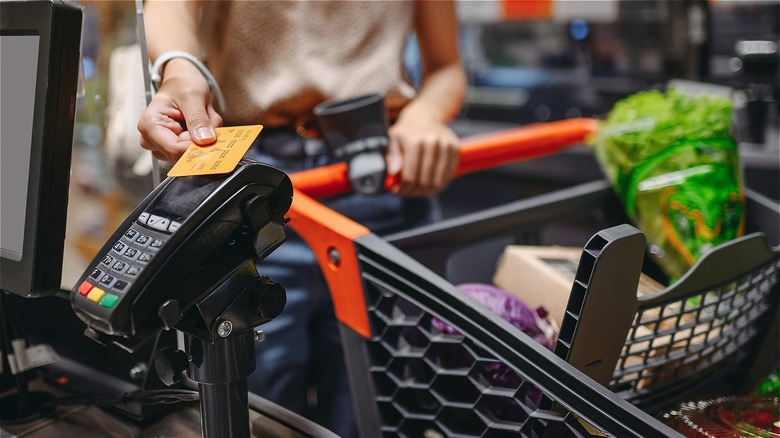Should You Be Worried About Grocery Stores Collecting Your Data?
We may receive a commission on purchases made from links.
In the 21st century, data is everywhere. We're generating more data now than at any point in history — by the end of 2020, we were generating 2.5 quintillion bytes of data every day, per FinancesOnline. Just for context, a quintillion is a billion of a billion or a million trillion – a 1 with 18 zeroes. Wrap your head around that.
And retailers love collecting your data. Target, for example, collects your name, home and email addresses, what kind of phone you're using, if you're a teacher, a student in college, or in the military, and even what you might look like. Some of this you knowingly provide when you order something online, use your RedCard, or create a gift registry. Other data you might not realize you're providing, like when you access Target's website. Target allows third-party companies like Google to track and collect information about how you interact with the site, but Target's privacy policy doesn't cover those third parties, meaning they don't know what happens to your data after the third party acquires it. And Target is really good at connecting the dots between what's collected automatically and what they already know about you to create a shopping profile and give you a more personalized experience, per Target's privacy policy. Some consumers might find all this data collection useful — Target knows you're a parent so you receive coupons for diapers in your email, which is great. Others might be wonder just how much retailers know.
The retail advertising business saw rapid growth through 2022
While your discount card saves you money, you're giving companies much more than you may realize. All of the data connected to shoppers is highly sought after by consumer brands. According to Harvard Business Review, the data you generate is collected and analyzed, then sorted into "customer audiences" or groups of people with similar habits, demographics, or interests. These audience segments are purchased by brands for ad-targeting purposes. Kroger even runs its own data science company called 84.51, which analyzes and sells the insights generated by its customers to brands that sell products in Kroger's stores, according to The Markup. This generates huge revenue in the retail advertising space. Per The Wall Street Journal, the total projected revenue from retail ad sales for 2022 was $40.81 billion, making it a lucrative new revenue stream for retailers. With more awareness surrounding tracking cookies across websites and devices and a focus on data privacy making ad targeting more difficult, consumer data from retailers is highly valuable. Brands pay a premium for that data — so much so that chains like Kroger or Walmart can probably turn a higher profit selling customer data than sacks of potatoes.
So, should you be worried? It depends on how comfortable you are with just how much they know about you and what they do with that data. If you're wary, definitely take the time to read the company's privacy policies surrounding data collection and use.

